 If you’ve done any look into the history of Southern Baptists, the sacred effort hasn’t always been a neat and tidy one. Our convention’s founding was under the auspices of allowing and protecting slave owners during the contested period of abolition. Many of the early statesmen in the SBC actively served in their states’ secession from the Union and actively served in the Confederacy (Williams and Jones book Removing the Stain of Racism from the Southern Baptist Convention goes into much detail about the worldview of white supremacy and slavery). Since then, whether it’s been embezzlement, theological controversy, a Disney boycott, accusations of liberalism (and actual theological liberalism in the 1950s-1980s), near bankruptcy, and more conflict. If there’s anything that our Convention enjoys as much as the Cooperative Program, it must be drama. President Litton’s announcement wasn’t surprising, and I for one am glad that he has served this year as SBC president. He oversaw the formation of the Sex Abuse Task Force, advocated for the will of the messengers with the Executive Committee, will leave his footprint in his appointments that will be felt for years, and most of all has allowed Southern Baptists to get to know the better Litton, his wife Kathy. I’m also glad that he chose not to stand for reelection. I would gladly raise a ballot for him in Anaheim, but his decision puts the Convention ahead of himself. I don’t believe his decision was a capitulation to the Twitter mob, but rather an earnest desire to not be in the way of the SBC moving forward. However things shake out in Anaheim, and the messengers will speak and their voice will be heard, the one sacred effort will continue as we see churches planted, missionaries sent, and the Kingdom expanding. These are the five things I’m hoping and praying will happen out of our time in Anaheim:
2 Comments
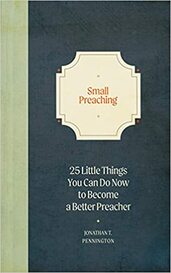 Convention breakfasts are usually way too early after a long day and before another. But one of the perks is that you can often get some cool swag from them. Hat tip to Southern Seminary for including this little gem in their giveaway for the SBTS breakfast at the Florida Baptist Convention last fall! During my time as a student at Southern, I was so fortunate to have a few classes with Dr. Pennington and see his passion and devotion to the Word impact students for more faithful ministry. Reading this book was almost like being transported back to New Testament survey and seeing the combination of scholarship, worship, and some good learned British wit all brought back. Thanks for putting this together to help us be better in the pulpit.  I would recommend this book to any of you in pastoral ministry, no matter where you are in your ministry journey. Sometimes I fear that education and experience give us a sense of teflon where we forget that we need to circle back around to elementary principles time and time again. As Pennington says about our own need for evaluation and growth, entropy is the default rather than growth. So we have to be intentional. Intentionality in preaching begins with our own preparation and our own spiritual growth and engagement in preaching. Only once we have been enwrapped in the text and been changed by it can we even begin the creative process of crafting the outline (or manuscript) that we use on Sunday. Two things that particularly jumped out to me: 1. Encaustic Preaching - Gosh this essay was so good. Our job in preaching isn't to every Sunday have to recreate the Sistine Chapel, but to add a new layer to the canvas before us in God's people. Every week we're adding something more to the work of God, one more layer that makes the people before us more like Christ, one more color in the beautiful work of redemption, and one more step closer to the finished product. Preaching and shaping the image of Christ in others is the long view, it's a journey of decades one Sunday and one message at a time. 2. The First and Last Minute - The art of homiletics is often like flying a plane. The tricky parts are the takeoff and the landing. Everything else is cruising. My friends who are pilots may not agree, but be kind in the comments. For most of us, especially those who have given years of study in seminary and have a bent towards the academic, exegesis and theological analysis and explanation are pretty natural. For us, they're cruising altitude. And our default can be to want to get to that point without doing the work of takeoff, and we can want to get done so quickly from our exegesis and analysis that we crash instead of landing the plane. The first and last minutes of our preaching are, for better or worse, what will stand out in people's memory, so let's commit to making sure they are done with excellence, clarity, and will help take our people to Jesus.  For pastors, far too often we can get tempted to have the same attitude that took over baseball in the 1990s. Then it was made famous by the phrase "chicks dig the long ball" as record home run years were the news. Now it's an attitude of "churches dig the awesome sermon." Every week we feel the pressure to deliver, to really drive, to make this week better than last week, and if we're really honest with ourselves we're maybe even looking for the viral soundbite. If you'll let me use the baseball analogy a little more, may I propose a shift? Maybe it's not that God wants us constantly swinging for the fences every week, but that our faithfulness in ministry is consistency with a long view in mind? Maybe it's that God wants us to be like Tony Gwynn more than he wants us to be Aaron Judge? Aaron Judge, slugger for the Yankees, looks every part of a video game character. He's huge. And strong. And when he hits the ball it comes off the bat just sounding different. Except when he strikes out. Which happens, a lot. In his career since 2016 he's had 2,068 at-bats and has struck out 733 times. Sure he's hit 158 home runs in that same space. But more often than hitting it out he's walking back to the dugout. Compare that with Tony Gwynn, who looked nothing the part of a video game character. In fact, on appearances he looked like the computer team you'd beat up on in the practice version. But when he stepped into the batter's box, everything changed. He came the closest to hitting .400 since Ted Williams, and his lifetime average of .334 is 16th all-time. Even more surprising was his strikeout rate. In 9,288 at-bats, he struck out a total of 434 times. He may have only hit 135 home runs in his career, but rarely did he walk back to the dugout from striking out. Thank you Baseball Reference for the stats here. Pastors, here's what I want you take away from this: 1. Every week, stand in the pulpit and take your swings - Don't be afraid to step up, don't quit (especially on a Monday), and don't make excuses. When it's your time to go, get up there and go. Trust in the leading of the Holy Spirit and the work of preparation you've done before standing before God's people. Hitters become hitters by hitting. 2. Don't aim for the fences, give your people consistency - Keep giving in your preaching a steady diet of Bible exposition and application. Tell them what the passage says, what it means, and how it applies to them. Challenge them. Encourage them. Love them. Bless them. Plead with them. And do it consistently. Over time, you'll see a difference in them and in the church. 3. When it happens, swing hard - Every now and then everything just feels right. You know what this is, it's "the groove." Don't forget Tony Gwynn still hit more than 100 home runs. Every now and then he connected on one that was perfect. When you as a pastor get the chance to swing for the fences and you're in the groove and you're feeling the Spirit pushing you, go for it. 4. Trust God - The difference in hitting and preaching is in hitting you're in (relative) control of what happens. In preaching, you're not. So pastor, trust God. Give it all you've got, and leave the results up to God. You never know, God may be using a message you preached where you felt like you absolutely whiffed. Or He may take a point you didn't think much about to leave an impression on someone that draws them closer to Jesus. 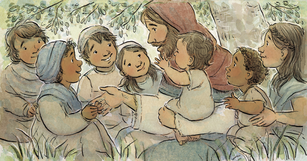 Not only as a pastor but as a dad, I love the impact of a kid-friendly church. It's a church where kids aren't just tolerated but loved, a church where kids aren't just seen but are heard, and a church where children are discipled and formed to love Jesus. By God's grace our boys were both born into a church that was super kid-friendly and part of preschool & children's ministries that were so crucial for their faith development. We could think of so many people surrounding our family and our boys that helped point them to Jesus and we believe were used by God to help them both find faith in the Lord Jesus. As a pastor, it's something near and dear to my heart to cultivate a kid-friendly church. I'm personally invested and driven in this. My boys are those kids who need a kid-friendly church. They're on my heart every moment in making decisions and seeking what God would do with our church. As a dad, I want them to love the church, to see her as the Bride of Christ, and to look at it as something beloved and precious. As a pastor, I want kids like them to do the same. Cultivating a kid-friendly church is tough, but if we're going to reach the next generation and embrace them fully into the fellowship of the local church, we have to do the hard work. 1. Carve out space for them - Creating a kid-friendly church means carving out dedicated space for them. If they're meeting in the "last possible option" of meeting space, you're treating them like leftovers. Creating space prioritizes the ministry to and for children. Let's face it, we're all dealing with limited physical space. What better way to say we prioritize children than giving them space! Space that's safe, space that's easily accessible, space that's clean, space that's welcoming, space that's adequately resourced and staffed, and space that communicates we care about children. If you've got open grassy space, get a playground. If you've got a parking lot, it can hold a basketball goal. You don't need a rock climbing wall or a slide in your children's area, but these things communicate that you care about kids & families. 2. Embrace them - Kids are going to make noise. They're going to sometimes be a little rambunctious. They're going (GASP!) wear shorts to church. When Jesus said in Matthew 19:14 "Let the little children come to me" there wasn't a condition on it. He never said "as long as they sit perfectly still and are quiet" or "so long as they act right" or "as long as they're not in anyone's way." Nope. It was simply let them come. Obviously parents have a responsibility to make sure their kids don't roll through a crowd of people standing in the foyer or use the flagpoles as lightsabers, but kids don't always do exactly what we want them to do. And please, whatever you do, don't become the "Kid Police" making them feel unwelcomed and unloved by shushing and scolding them. No matter your (or whoever is doing it) intentions are, you are not the parent. 3. Involve them in the Body - I know my first point was carving out space for kids, but if we put them in the back of the church and sequester them from everyone else, we're not truly involving them in the Body. It doesn't have to be intricate, it can be the "children's message" during the service, or having older kids pray in service, or if your church has a children's choir or drama team to involve them in the worship service. One of the best things our former children's minister did was "Cross Generational Fellowships" where our senior adults spent the morning with our kids ministry. By simply putting them in the same room there was an opportunity for both groups to invest in and love one another. 4. Minister to Parents - The three things parents look for with their kids are safety, Jesus-focused, and fun. But so often in parents' lives they are left behind because of all the focus on their kids. And at some level, all of us who are parents are ok with that. We'll give our kids the last cookie on the table or make sure they have new shoes before we do. But parents need ministry too. If your church is connecting to families, where do parents go? Do you have groups for them? Do you have resources in your church to help equip and encourage parents? One way to do that is to point them out in your preaching or announcements. A children's ministry that ministers to parents will stay on top of what's being written and produced to help parents navigate the difficult waters today. What would you add to cultivate a kid-friendly church? Leave a comment!  If you're not part of the SBC or aware of its situation, this post might not be for you. I'll be back writing regularly on other less-drama-filled situations soon! In the meantime, you can argue about who should be in the College Football Playoff. If you need to catch up and have many hours, you can watch the streams here. When asked for a word to describe the current situation with the SBC Executive Committee and its refusal to follow the directive of the messengers, the word I initially used was "disappointed." At the time I had the picture of being a teenager and doing something really stupid and my parents saying that they weren't mad but disappointed in me. I'd let them down. I'd failed them. I'd messed up and had done more than misbehave, I'd hurt them. That's what I meant by saying I was disappointed. But perhaps a greater description takes two words: Colossal Failure. I know sometimes we're captive in the moment and wrapped up in hyperbole. We're all victims of the recency bias with whatever the most recent thing we've done or eaten or seen is the best/worst thing ever. So it's important that when we use descriptors like colossal failure, we have to be more than captured in the moment. And that's where we as a Convention of churches find ourselves today, in the midst of a colossal failure of leadership and a failure of those we have entrusted to do what it is they have been tasked to do. Perhaps the most telling point that this is a failure of trust was when one of the trustees made the comment that the messengers have no right to tell them what to do. The second was when a trustee asked the question "How much is a little girl worth?" and was met with snide comments describing it as emotional blackmail. At least the quiet parts are being said out loud. Pastors and churches are deservedly frustrated, angered, and questioning the very nature of our cooperation. Those feelings are way behind and way less important than the pain, trauma, and ongoing scandal we're giving to survivors of sexual abuse in our churches, whose stories have been questioned and dismissed for decades. As one SBC pastor and messenger to the 2021 meeting in Nashville and, Lord willing, a messenger to the 2022 meeting in Anaheim, my individual voice is limited. But together, just as our spirit of cooperation says that we can accomplish more together than we can apart, we can speak truth to power and hold those accountable who should know better. Can I encourage a few ways of leveraging our collective voice? 1. Contact Executive Committee staff and trustees - Affirm their position of trust within the convention and the role they play in the 363 days the Convention is not in session. But also speak of their duty to fulfill the will of the messengers. Each state convention has representation on the EC, and you can find all their contact information on the EC website. Letters, emails, tweets, texts, and phone calls are all available for you. Authority in the Convention is not based in a board room at 901 Commerce Street, it's in the local church. If you are a cooperating church in the SBC, you have a voice. 2. Contact the Sex Abuse Task Force - They are put in a spot of being between a rock and a hard place. They are limited in time by the motion affirmed by the Convention in Nashville, and they have a responsibility to oversee a massive investigation. They are doing this service because of their love for Jesus, commitment to the SBC, and a desire to do right by survivors. They're discouraged, disappointed, and need encouragement. 3. Engage on Social Media - It's really easy to dismiss social media as a time waster and a collective angst. And in some cases it is. But there is redemptive value in the gathering of like-minded voices and influencers to speak truth to power. Join in the conversation. Engage with other pastors and leaders. Use the magnitude effect of social media to amplify the call for transparency and to fulfill the will of the messengers. 4. Support our missionaries and entities - The way our funding structure works is that the Executive Committee has the power of the purse to distribute CP giving to the appropriate entities, which include thousands of committed missionaries in North America and globally. Give them encouragement, find out how you can give directly to their sending agencies (NAMB and IMB), and commit to pray for them. Our six seminaries are carrying a great burden of preparing future ministry leaders in the SBC, and the future is bright. We are training leaders to carry the baton into the next generation. 5. Research your options - I know a lot of pastors are asking if they should continue their current mission giving or explore other formulas. Do your homework. Find out what your options are. There are avenues to explore how your church can be a part of God's mission through the SBC model. You can bypass the Executive Committee in your giving, and your state convention has a fiduciary (there's that word!) responsibility to do the will of its churches. So if you contact your state convention and say that you want to change how your mission giving is used, they have to follow your directive. 6. Support survivors - During one of the EC meetings, survivors were mentioned as "that lady a long time ago" or some other anonymous and dismissive tone. They have names. Jules. Hannah Kate. Tiffany. Christa. Jen. And thousands more. Use their names. Speak their truth. Share their stories. Affirm their pain. Pray for them. Speak encouragement to them. They have fought against stone walls to get their stories heard. They have paid their own way to get to these meetings and seek an acknowledgement of the truth. 7. Make plans for Anaheim - Decisions are made by those who show up. A lot of Twitter chatter surrounded the 2021 meeting in Nashville. But the only people whose voice mattered were those who held a ballot in their hands. I know that sounds harsh but it's reality. The Convention only assembles once a year for two days. They're important. And if you want to speak into what's going on in our Convention, you have to be in the room when the votes are taken. Hotels go up tomorrow, make your reservations ASAP. If I may speak directly to the Executive Committee members and staff, truth and transparency matter more than our reputation or even the survival of the Southern Baptist Convention. If the independent investigation finds incidents of sexual abuse coverup and mishandling and our insurance companies refuse to pay, we deserve to be sued. If unsavory emails are discovered that taint the reputation of our heroes and we see the seedy underbelly of institutional sin, it's worth way more to be truthful than for us to think everything is ok. If at the end of this people are fired or potentially liable for prosecution, that's worth much more than any kind of PR hit or cover. Truth matters. Transparency matters. Trust matters. Do the right thing. Waive privilege. Fully cooperate with the Task Force. And sit this one out. If not, I'll see you in Anaheim. And my ballot will be used to make sure our trustees and institutions are accountable to the messengers. I shared this letter to our church family and am passing it along if it's of any value to you in your ministry context. The file itself is available here.
In 2018 the Barna Research Group released a study that found "sharing faith is increasingly optional to Christians." While we'd all agree that it's important for individual Christians and churches to intentionally reach out into the community to people who don't know Christ, the data shows that it's something we don't necessarily do.
The natural bend of a church isn't outward, it's inward. It takes intentionality to keep focusing on the outside. It's not bad to look inward. We all enjoy fellowship and part of the church community develops into close relationships. We can and should rejoice at that. But without intentional outreach on the part of a church or individuals, we quickly become an inwardly focused and inwardly serving existence. As Thom Rainer says, the Holy Trinity of the inward facing church is "Me, Myself, and I." Five common barriers to outreach, and a way to work through them, are: 1. The Church doesn't know its community - Communities aren't made of demographics, they're made of people. But demographics give us a glimpse at who is in our community. Do we know the trends of who lives near us, or do we assume that the community is the same as we moved in? Data is important, but not nearly as important as relationships. Here's an exercise: write down the names of the people you're connected to in your church. Now, write down the same number of names of people you know who aren't connected to a church or a relationship with Christ. Then write down the names of people you are connected to in your own neighborhood. If we don't know our community, we'll never know its needs. Response: Drive the streets slowly. Prayerfully drive through your neighborhood today. Don't just breeze through until you get home. Pay attention to who you see when you go to the grocery, restaurants, and ball games. 2. Fear of rejection - Nobody likes being rejected. It's normal. We especially don't like to be rejected when it comes to sharing our faith. So we keep quiet instead of opening the risk of being told no. Recently I came across a figure that said the average adult hears a clear presentation of the Gospel on average of 7 times before trusting Christ. That means six rejections on average. Rejection is a reality of outreach. You'll invite neighbors to church only to be (sometimes) politely told no. Or you'll talk about the hope of the Gospel with a co-worker only to be brushed off. But chances are any time we reach out, we're doing the long work of God. Response: Embrace every opportunity to share as a part of God's long work. Pray before sharing. Trust God with the results. 3. Not Knowing How - I get it that some people may not know what to do with an outreach event or conversation with someone who doesn't know Christ. Sometimes we can get clunky or nervous and we sound like Chris Farley nervously interviewing people. Or we don't know how to turn a conversation about football or weather or politics into a conversation about Jesus. It becomes a barrier because we buy into the myth that if we don't know how to do it as good as _______, or with the precision of an evangelist, or with the skill of our heroes, that we shouldn't do it. Response: Tell your story of what God has done. Not someone else's. Not some parable. Your story. 4. Lack of Resources - We serve the God who is the owner of the cattle on 1,000 hills. Nothing is too much for Him. He owns it all, and He is Lord of all. But your Outreach budget might not be very much. Your church may have a lot of willing bodies but not a lot of able bodies. Or you may not have very many bodies at all! It can be discouraging, especially if you're pastoring or part of a "smaller" church when you see the cool graphics and campaigns the "bigger" churches do. Seriously, I went to one for a community event that had a slide in their kids area. Our ability and opportunity to reach out to our community isn't dependent on our budget or bodies. It's dependent on our willingness to be faithfully obedient. Response: Figure out what you can do. Every church, no matter what size, can do something to reach out into the community. If you have retired teachers, you can do a tutoring outreach. If you have handymen, you can do some basic home repairs. If you have an established church with a field, you can let a soccer club use it for practices/games. 5. Apathy - This one is the saddest. And honestly, the response is pretty brief. But sadly, I think one of the barriers to outreach for churches and individual Christians is that they just don't care enough to do anything about it. Maybe they know it's important, but not more important than what's on their calendar, or more important than the final round of the golf tournament, or more important than who the Masked Singer is, or more important than our own comfort. It's not that we don't care, it's that we don't care enough for it to change us. Apathy is the enemy of outreach because it shows that we don't see our neighbors and community as important enough for our time and effort. Response: See the people around you as image bearers of God who, apart from Christ, will spend eternity separated from Him in Hell. If that doesn't break your heart, check your pulse. One thing you can do as a church is an initiative published by Church Answers called Pray and Go. It's a low-impact, non-intrusive way of getting into your community by praying for your community and seeing what God does. I'm excited. Our church is launching it this weekend, and we're looking forward to how God uses this as a way for us to love our neighbors.  I was in Jacksonville for little more than 24 hours and I came away with one big observation: that city is all in on Trevor Lawrence. The local news was counting down the seconds until the NFL draft, they were covering every aspect of his workouts and endorsements, they were promoting Jaguars games on TV, and there were already billboards up. Even before the first pick is made, the city of Jacksonville has something that every city with the #1 pick has - hope. Hope comes from wishing and longing for a better place. For long suffering football fans, it's the dream of being out of quarterback purgatory. Seriously. Ask any Browns fan what the last 20 years have been like. Or Dallas. Or Washington. Or basically everybody but New England until this past year. Everyone wants hope. Hope sells. Hope invigorates. Hope fuels. Hope gives. Any football fan can tell you though that hope isn't a sure thing. Some cities land those top picks and get Peyton Manning, Baker Mayfield, John Elway, Troy Aikman, or Andrew Luck. Others get those top picks and get Tim Couch, JaMarcus Russell, Akili Smith, Jeff George, or David Carr. NBC Sports can even give you a list of notable NFL busts who were drafted with a banner of hope. If you're a pastor or a ministry leader, you're a hope purveyor. You're not selling hope like an agent trying to get his client a high draft pick. You're not selling hope like a team telling the city they're saving space for the championship trophy. You're not walking into a press conference with big plans and big dreams. You're telling people about Hope personified. Unfortunately far too many ministry leaders aren't purveying hope, they're pushing fear. Don't sell fear. Give hope. Hope has to start from within. Are you living by fear or hope? When you watch the news, do you want to retreat into a bunker (fear) or missionally engage (hope) a broken world? What motivates you? Pundits on TV using recycled talking points or new faces who don't look like you but need Jesus as much as you? What drives you? Are you worried about gaining or losing "market share" like churches are a business, or are you worried about seeing people die without Christ? Live out hope. Live out the joy that comes from knowing Jesus and resting in His providence and care. And lead others to do the same. Because unlike a quarterback with knee problems, Jesus won't ever disappoint. Unlike a head coach who bolts for a new job or a pitcher with the yips, Jesus won't ever frustrate you. Why? Because He is our Hope.  Pastors, I get it. You're exhausted. This year has presented so many unique challenges it's hard to even remember where to start. On top of it all is an election we all knew was coming and the fallout ahead of it. It's been hard. And there's no guarantee that on November 3rd we'll have any resolution. It could make the 2000 decision look simple. Where's that giant meteor that everyone was talking about? It's exhausting. In the home stretch with less than 2 weeks until the Election, can I give you a few suggestions for your own sake and for the sake of the church you lead? 1) Unplug for a day, or two, or more - You gotta give your soul a break from seeing the constant flood on social media, the endless talking heads on cable news, the full email inbox from politicians. We were not made to consume the sheer amount we are. So unplug. Delete Twitter from your phone for a day or two (or longer). Disengage on social media. The internet is a breeding ground and amplifier for toxicity. 2) Love people - I didn't put a qualifier there. There's no need. Love people. There are people in your church who are nervous about another 4 years of Trump, and there are others who cannot imagine a Biden/Harris administration. However they vote or respond or pester you about things, you love them. Jesus did. And does. 3) Keep perspective - It's really easy during the cycle to get sucked into the vortex of "this is the most important thing in our lifetime." The cynic hears that and remembers hearing it 4, 8, 12, 16 years before. The fanatic hears that and jumps in wholeheartedly. Reality is in the middle. The message to share with your church and your own heart is this: elections are important and have consequences, but they are not binding on eternity. 4) Pray and let God worry - The posture of a Christian during tumultuous times is prayer. The posture of a Christian during good times is prayer. The posture of a Christian when facing national crisis is prayer. The posture of a Christian in every circumstance is prayer. God is the one who raises up princes and leaders, who brings about all the events above the fold and on Buzzfeed to pass. Nothing is beyond His authority. And He, not you, is the one who's holding the fabric of the universe together. I know a lot of people who read this are serving in ministry. This article isn't for you. This article is for those who read who are members and attenders of churches. I want to give you some advice on what you can do this year for your pastor for Pastor Appreciation Month. October is traditionally the month where churches recognize and appreciate the work that pastors do. Paul talks about blessing God's ministers with a "double honor" which is a good thing to do. Pastors labor behind the scenes and carry the weight of the church on their shoulders. Compound that with the toxic political climate and the pandemic, 2020 is a year to really honor the work pastors do.
The first thing I'll say is not to get your pastor a Bible. Or a tie. But especially not a Bible. It's not that a gift Bible isn't a gracious thing to consider. But your pastor has (or at least should have) a number of Bibles. They might even have some very nice ones. Another Bible, no matter how well intentioned, is likely to end up on a shelf and won't be as fully appreciated as you'd like. But what can you get or do for your pastor this month? I want to suggest a few options. 1) A gift card - Surely your pastor has a favorite restaurant, coffee place, or home improvement store. They can certainly use that card for a treat, an upcoming project, or to feed their coffee needs. 2) Remember their spouse - Ministry spouses are many times forgotten. It's not intentional. They're just not usually the ones in the public eye. They're taking care of the kids, they're working in their job during the week, and they may not be comfortable being in front of everyone. Like the gift card, find out what they like and see if you can do something to care for them. 3) Getaway - Some churches are blessed with having people who own vacation property or have access to a beach house or something like that. Consider giving your pastor and their spouse a weekend away at that property. Get their Sunday responsibility covered so they don't have that on them while they're away. Let them recharge, rest, and reconnect with one another. 4) Date Night - Sponsor a date night for your pastor and spouse. One of the hardest things for pastors with families to do is arrange childcare. Babysitters can be cost prohibitive for some couples. Take care of that for them so they can have an evening out. 5) Day trip - COVID has really messed up a lot of family plans. Many had to cancel vacation plans this summer, and with kids doing NTI and remote learning the fall break calendar is messed up. Consider gifting your pastor and family a day trip. It could be an amusement park, zoo, state park, or some other attraction. Most of us live close enough to something neat like that that a day trip is possible. 6) Extra vacation - Finances in your church may be tough. COVID hit some churches hard and really limited their budget. You might not be able to financially give anything to your pastor this year. Giving an extra week of vacation is another way of appreciating their work and thanking them for what they've done. 7) A conference - Conferences can be a really helpful thing for a pastor to recharge, fellowship, grow, and be sharpened for ministry. Whenever we can have them again, consider this as a possibility for your pastor. Several years ago this was a gift someone in a church did for me, and it was so encouraging to get away and grow. If possible, see if you can arrange to send their spouse as well. Whatever you do, I hope you'll do something. Don't do what some churches do to their pastors and send them a note that says "Appreciate that you have a job." (This has really happened) Ministry is hard. Doing something to show your appreciation for your pastor can be a boost for them, and encourage them in a year where things have been even harder than normal. |
Scott M. DouglasA blog about leadership and the lasting legacy of family ministry. Archives
August 2023
Categories
All
|
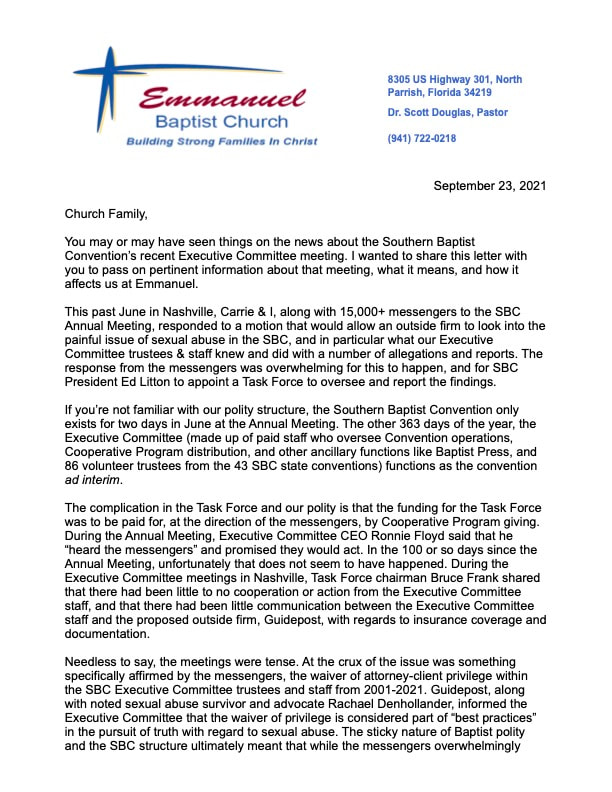
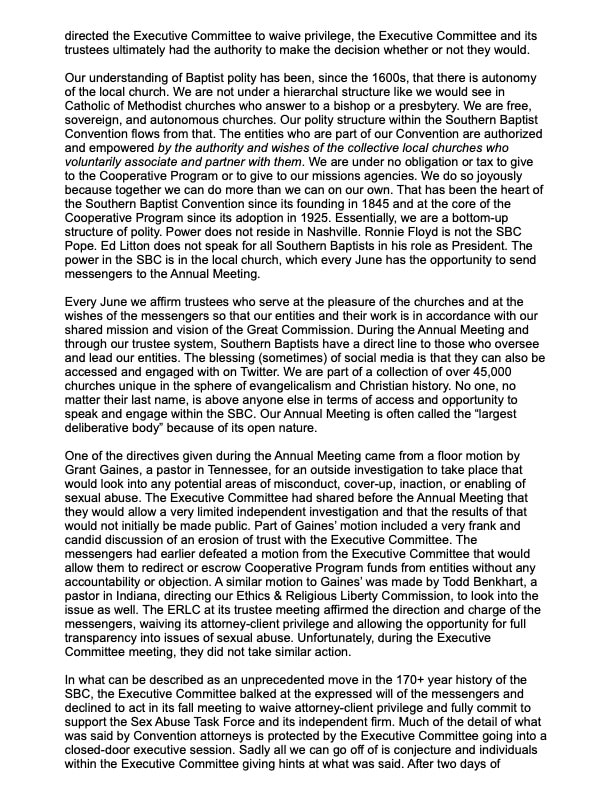
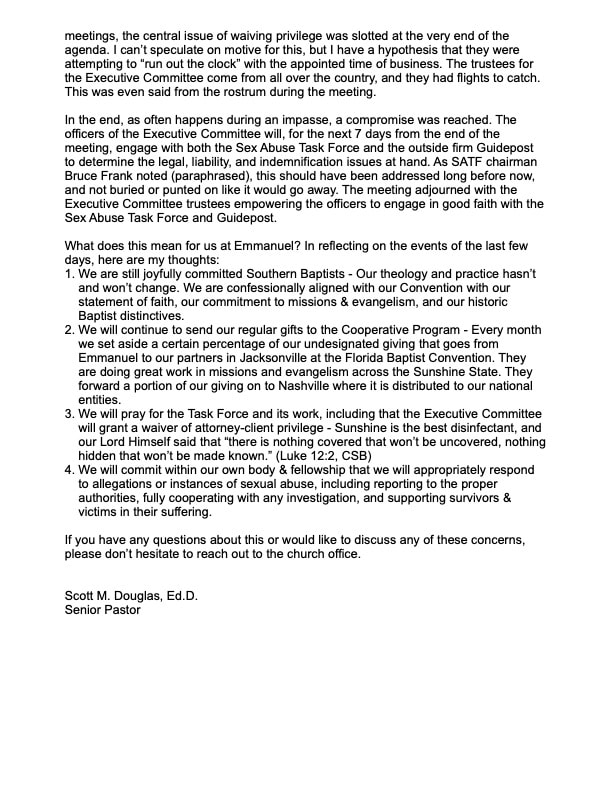
 RSS Feed
RSS Feed



